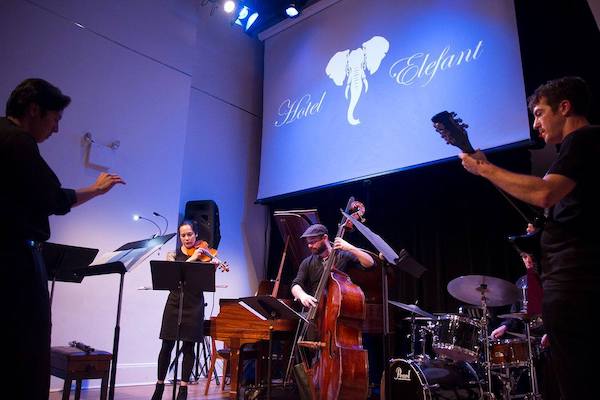Two works stay in the memory in Hotel Elefant opener

Hotel Elefant, now in its eighth season, is a contemporary music ensemble focused on living composers. They opened their 2019–20 season Friday night with a short program at Areté, a small venue in northern Greenpoint.
The program opened with Spirare (2018), a brief piece by Carlos Bandera for clarinet, violin, and cello that begins with what feels like a cold breeze: pitchless blowing on the clarinet, with faint brushing on the strings. The initial hush grows into a haunting drone, then wild trilling figures punctuated with ricochets, tremolos, pizzicato. There isn’t a tremendous amount of development in Bandera’s musical ideas, but Spirare is interesting as a study in varying levels and varieties of tension.
The Way Things Work (2016), by Hotel Elefant’s executive director, Patrick Castillo, contrasts roughness and violence with stillness in a duet for violin and cello. Scattered lines move quickly from one idea to the next. There is a kind of expressiveness in the competing lines of the two instruments, even if progression is difficult to follow.
Alexandra Gardner’s 2001 composition Spotted Jasper paired bass clarinet and marimba over a background of pre-recorded electronics. Gardner’s music creates a feeling of calm, even if it is in constant motion: the marimba plays a hypnotic running pattern while the clarinet lets out long, slow breaths, occasionally stringing together a slinking melody. The contrast between pre-recorded bass clarinet sounds and the real thing was jarring at times, but for the most part the sound of falling water contributed to an overall shimmer in the composition.
Kaija Saariaho’s 1990 Oi kuu, (“for a moon”) was the most inscrutable item on Friday’s program. Scored for cello and bass clarinet, her stated purpose was to explore the similarities of register and timbre between the two instruments, which she certainly does—but six minutes of the two instruments breathing in unison, with a little motion in the middle, quickly turns rote.
The first four pieces on the program, though each showing a different voice, suffered in that they all felt to some degree like a sound study, which taken together grew monotonous. The final two items were a welcome change, both showing more direction in their treatment of musical ideas.
Sean Harold’s Nachtlied (2014) is a playful homage to Mozart and Bach, taking a prelude and fugue from Mozart’s KV 404a and pulling them apart. The piece is slow to evolve at first, with harsh chords growing out of unison but there is a distinct feeling of direction to the piece. In particular, the second of Harold’s 3 short movements showed a wry sense of humor, with deconstructed snatches of Mozart popping in and out of focus; leading phrases “resolve” into a wild jumble of bow strokes.
Closing the program was the strongest piece of the night, Lois V Vierk’s well-known Red Shift from 1989. The development of the music here is clear, from near-silence to vibrant, crashing activity, but the progression from one to the other is so gradual, it’s almost undetectable in the moment. The competing glissandos of cello and electric guitar in the opening develop into wider gestures, bringing an increased sense of activity as the percussion grows in complexity and all of the parts become more active. There is never a change of tempo or pace, but rather a feeling that a massive, distant object is growing closer and closer, coming into focus. Hotel Elefant’s musicians played with expert precision under Castillo’s direction.